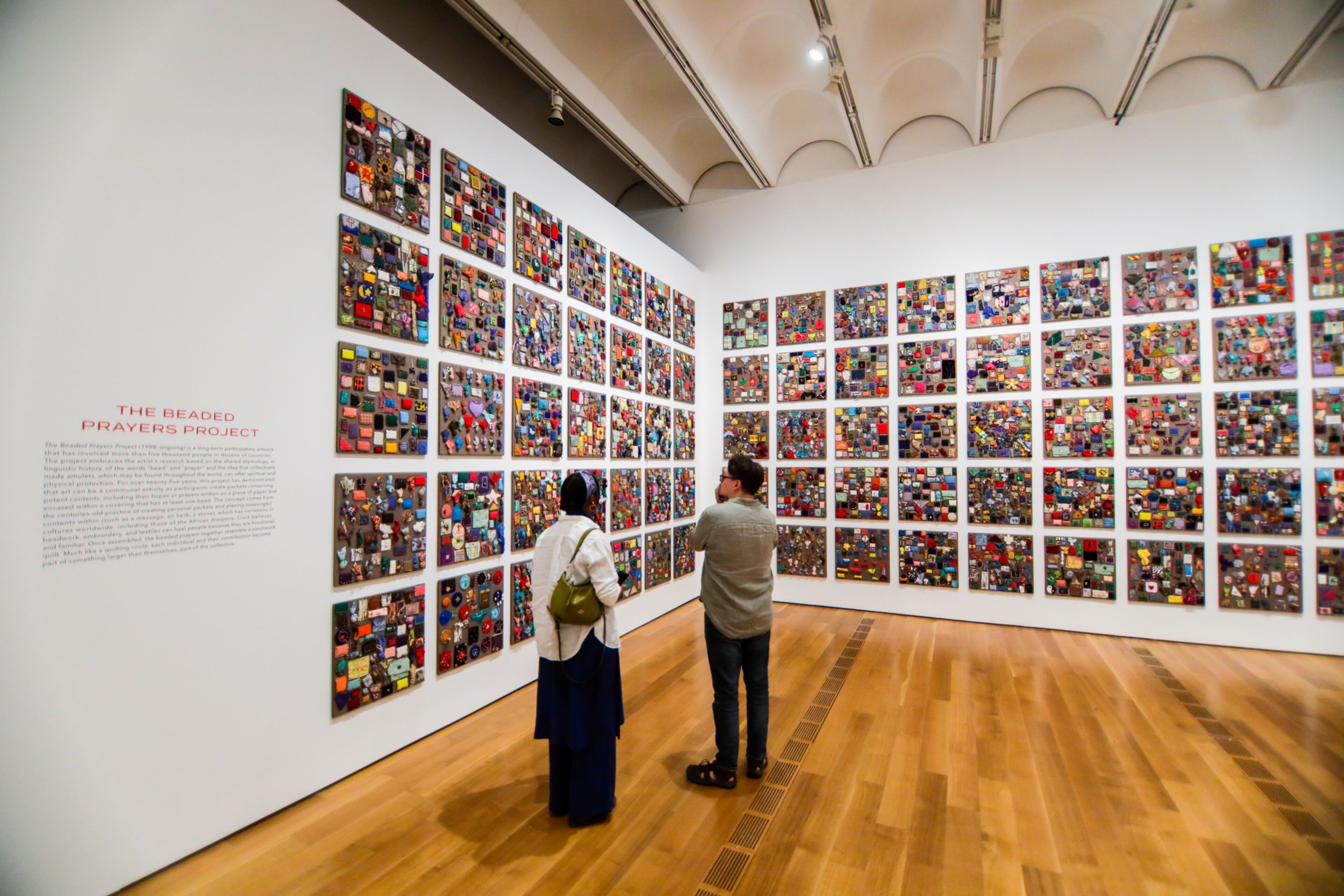Fiber artist confronts racism through Black hair, unraveling flags and more

This story was originally published by ArtsATL.
Every part of fiber artist Sonya Clark’s exhibition at the High Museum of Art drips with intention.
The homage to Black women. The fight against hate. The reminders of the strength in community.
“We Are Each Other” (through Feb. 18) is a multisensory collection of Clark’s large-scale participatory projects over the last 25 years. It’s an introspection-inducing journey through the reality of unceasing oppression, the collective responsibility of society to dismantle it and the equally unceasing spirit of a people who were never expected to survive.

The artist uses fibers and found objects to tell stories about history, racial injustice, cultural endurance and reclamation, often inviting people to cross the line from observer to participant.
“When people are working together or engaged in making the artwork itself, they go beyond looking at how it connects to their story — they become a part of the story,” Clark said recently during a phone chat with ArtsATL.
Interaction helps people remember, she said. And memories, images and poetry can never be taken away by oppressors.
The exhibition also includes short films, photographs and performance pieces.
“The Beaded Prayers Project” welcomes viewers with panels of colorful, beaded pouches. Since 1998, thousands of people around the world have placed their prayers, wishes and intentions into the pouches, which encourages people to think about shared humanity: how many people, across race, gender and class want the same things, Clark said. (The High is offering free “Beaded Prayers” workshops Dec. 2, Jan. 6 and Feb. 3.)
The “Unraveled” series brings heaviness to that brief moment of hope. Collective deconstruction of the Confederate flag — since 2015, people have helped unravel it by hand — represents the crawling pace of progress and the many hands needed to sustain it. The piles of fallen threads are reminders of the tragedy of timelessness — that the centuries-old forces of white supremacy die hard.

“The struggle and demand for liberation are not new,” Clark said. “And as much as Black people are systemically oppressed, Blackness is also about the constant push to reclaim our rightful freedoms.”
She does so flawlessly in her focus on one of the most sacred aspects of Black expression: hair.
“As Black women in America, there’s nothing about our existence that is not political,” she said. “So I am purposeful about the work that I do. I am celebrating our Blackness, honoring who we are and our ancestors, making space for us and inviting wider communities into that space.”
Black hair — kinky, coily, gravity-defying as it stands up in its natural state — has a fraught and complex history, from Motherland crops that traveled to the Americas as seeds that enslaved people hid in their braids, to the afro becoming a political declaration during the Black Power movement of the 1960s and ‘70s, to the need for legislation like the 2019 CROWN Act, which protects Black people from hair discrimination at work or school.

Museum-goer Seyi Amouso contemplated the artist’s approach to Black hair as she walked through the exhibit. “Any representation of Black hair is beautiful,” she said, “but her thinking of our hair as an art form resonated.” Amouso said she used to use a chemical relaxer to straighten her hair.
“If I had come to this exhibit nine years ago, I think my experience would’ve been different because how I wore my hair was different,” she said.
According to Clark, hairdressing is the first art made of fiber. It’s part of what she calls “the ancestral archive.”
“The Hair Craft Project,” a celebration of Bantu knots, plaits, cornrows and other signatures, features Clark modeling braided styles by 12 hairstylists.
“It’s about me acknowledging the craft, the skill, the artwork that they do on a daily basis,” Clark said. “How they manipulate the fiber we grow into a complex form.”
Kinky hair is a constant throughout the exhibit, whether it’s balls of Clark’s hair arranged in the shape of the United States, works made with fine-toothed combs, a video of Black men reciting poetry in a barbershop or layers of hair that act as mortar between bricks stamped with the words of the Declaration of Independence.

The immeasurable influence of Black folks on this country cannot be denied, she illustrates.
She takes that influence further with Twist, an endearing font she created with graphic designer Bo Peng. The curly letters “challenge the cultural supremacy of the Roman alphabet and resist the European dominance inherent in its widespread use,” the exhibit explains. Poetry by Black women, written in the font, is framed, with the option to call a number to hear them recite it.
It’s a love letter for viewers who can see their own delicate tendrils on each page, written in a language that for so long was condemned by colonization.
“Deciding that I wasn’t gonna fight with my hair anymore was really helpful,” says Amouso. “Now I accept that it’s gonna do what it wants to do. And I love it.”
VISUAL ARTS PREVIEW
Sonya Clark: “We Are Each Other”
Through Feb. 18. $18.50. High Museum of Art, 1280 Peachtree St. NE, Atlanta. 404-733-4444, high.org.
::
Angela Oliver is a proud native of old Atlanta who grew up in the West End. A Western Kentucky University journalism and Black studies grad, daily news survivor and member of Delta Sigma Theta, she works in the grassroots nonprofit world while daydreaming about seeing her scripts come alive on the big screen.

MEET OUR PARTNER
ArtsATL (www.artsatl.org), is a nonprofit organization that plays a critical role in educating and informing audiences about metro Atlanta’s arts and culture. Founded in 2009, ArtsATL’s goal is to help build a sustainable arts community contributing to the economic and cultural health of the city.If you have any questions about this partnership or others, please contact Senior Manager of Partnerships Nicole Williams at nicole.williams@ajc.com.


